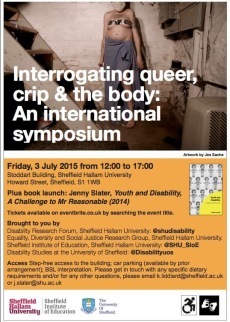

Bringing disabled women together, mobilising
and sharing through lived experiences
Engaged Allies: Academia, Activism & Crip Feminist Power
Reblogged from Kirsty Liddiard who helped in organising this event – with thanks also to Armineh Soorenian (Sisters of Frida North)
 Screening AccSex: Disabled Women Activism & Sexuality event, University of Leeds, 2015
Screening AccSex: Disabled Women Activism & Sexuality event, University of Leeds, 2015
The above photograph represents the end of¬†a brilliant day-long event which I helped co-organise along with some lovely folk from¬†the Centre for Disability Studies at Leeds University and¬†the disabled women‚Äôs cooperative, Sisters of Frida (of which I‚Äôm a proud member). The day was action-packed: a talk from Sarah Woodin¬†(Leeds University) on disabled women and forms of violence; a presentation on youth, feminism and the cripping of the political/personal dichotomy by Icelandic activists¬†Freyja Haraldsd√≥ttir and¬†Embla √Āg√ļstsd√≥ttir and their organisation,¬†Tabu; a¬†UK premiere of Accsex (2014), a film which uncovers¬†the pleasures (and precarities) of the connections between disability, sex/uality, gender, and race; and a Q&A with its creator,¬†film-maker Schweta Ghosh.¬†You can watch the trailer for Accsex (2014) here.
Within stifling dichotomies of normal and abnormal, lie millions of women, negotiating their identities.¬†Accsex¬†explores notions of beauty, the ‚Äėideal body‚Äô and sexuality through four storytellers; four women who happen to be persons with disability. Through the lives of Natasha, Sonali, Kanti and Abha, this film brings to fore questions of acceptance, confidence and resistance to the normative. As it turns out, these questions are not too removed from everyday realities of several others, deemed ‚Äėimperfect‚Äô and ‚Äėmonstrous‚Äô for not fitting in.¬†Accsex¬†traces the journey of the storytellers as they reclaim agency and the right to unapologetic confidence, sexual expression and happiness.
‚Äď Ghosh (2014)
A powerful line up makes for a powerful event, in more ways than one. To look again at the photograph, it’s far more than just a shot in time. It represents more than students, lecturers, activists, community members, allies, or otherwise interested people seeking alternative understandings of disability and gender coming together to connect (as if that isn’t exceptional enough). To me, the photograph is emblematic of the exciting possibilities that can emerge when the best parts of academia and activism come together. In this short post, I’d like to very briefly sketch out some points as to what this means to me as a disabled woman and scholar:
Safe(r) Spaces: Firstly, academic/activist events like this show that we can create (and demand) safe(r) spaces to speak about our lives as activists, campaigners, scholars and women.  Events like this offer rare occasions for disabled women and their allies to come together, think together, politicise and rage together, and take solace in sharing intimate knowledges of our lives (that are seldom acknowledged or celebrated anywhere) together.
Resistance and intellectual freedom: In the context of the Academy, the fusion of academia and activism can offer refreshing spaces of resistance, creativity and (intellectual) freedom. Never has this been more important to counter the significant corporatisation and marketisation of higher education in the neoliberal University, and what some have called the privatisation of knowledge. Another recent event I helped organise, Theorising Dis/Ability, worked in similar ways. You can access the talks from the Theorising Dis/Ability seminar here. I’m currently co-organising another event with my friend Jenny Slater (Sheffield Hallam) around the intersections of queer and disability/crip activism, Interrogating queer, crip and the body: an international symposium, for which you can access free tickets here.
 Interrogating queer,crip & the body: An international symposium
Interrogating queer,crip & the body: An international symposium
Making space for activist scholarship: For me personally/politically/professionally, academic/activist collaborations¬†enable me to continue the work I love to do.¬†It is a¬†reminder of the importance of activist scholarship,¬†which needs such spaces to not just survive, but thrive. I‚Äôm lucky that these loves are nurtured by many, many¬†brilliant colleagues. For example, see the¬†‚Äúdishuman‚ÄĚ manifesto that I‚Äôm working on with exceptional folk like Katherine Runswick-Cole (MMU), Dan Goodley (University of Sheffield) and Rebecca Lawthom (MMU). This work is as theoretically rich as it is grounded in disabled people‚Äôs lives and meaningful social and political change.
The politics of visibility and disruption: Most importantly, academic/activist presences¬†like those within the event above solicit/invite/welcome¬†a multitude¬†of bodies, minds, selves, knowledges and politics into the Academy.¬†These are often bodies and selves that are¬†at best tolerated, and at worst violated, in neoliberal educational spaces. To be present¬†in the Academy in such ways ‚Äď to proudly take up space, make noise, and be disruptive within the the very walls that so often¬†exclude¬†us ‚Äď affirms Crip feminist power. Crucially, it does so¬†in an academic landscape where we¬†are largely absent as students, let alone as educators, speakers, creators, and leaders.

Tabu: the political is personal
Note: This post is dedicated to the memory of Judith Snow who passed away on 31st May 2015. A proud disabled woman, visionary and advocate, she truly changed the world.

[…] we were at the Screening AccSex event at Leeds University, Sarah Woodin presented the findings of their report Access to Specialised Victim Support Services […]